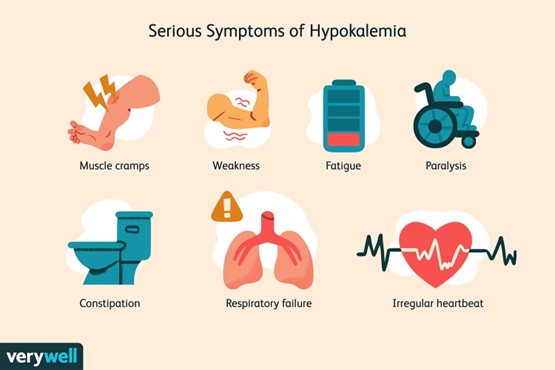A nurse in an urgent care clinic is collecting data from a client who reports having diarrhea for the past 3 days. Which of the following findings indicates hypokalemia?
Pitting edema
Diplopia
Muscle weakness
Hyperactive bowel sounds
The Correct Answer is C
A nurse collecting data from a client who reports having diarrhea for the past 3 days should identify that muscle weakness is a symptom of hypokalemia. Hypokalemia is a condition in which the blood potassium level is low and can be caused by excessive fluid loss through diarrhea. Potassium helps regulate muscle contractions, so when blood potassium levels are low, muscles may produce weaker contractions which result in muscle weakness.
The other options are not typical symptoms of hypokalemia.
a) Pitting edema is not a typical symptom of hypokalemia.
b) Diplopia is not a typical symptom of hypokalemia.
d) Hyperactive bowel sounds are not a typical symptom of hypokalemia.

Nursing Test Bank
Naxlex Comprehensive Predictor Exams
Related Questions
Correct Answer is B
Explanation
The correct answer is b. "I will apply petroleum jelly to the penis with each diaper change."
Choice A rationale:
- It is incorrect to focus on removing all yellow exudate.A small amount of yellow exudate is normal during the healing process after circumcision.Attempting to aggressively clean it off can irritate the delicate healing tissues and cause discomfort for the baby.
- Instead,parents should gently cleanse the area with warm water during diaper changes,allowing any mild exudate to naturally drain.
Choice B rationale:
- Applying petroleum jelly with each diaper change is an essential step in promoting healing and preventing discomfort after circumcision.Here's why:
- Protects against moisture:Petroleum jelly forms a barrier that protects the delicate healing tissues from moisture from urine and feces.This helps to prevent irritation and keeps the area clean.
- Reduces friction:The lubricating properties of petroleum jelly reduce friction between the penis and the diaper,which can minimize discomfort and pain for the baby.
- Promotes healing:Petroleum jelly creates a moist environment that promotes healing and reduces scab formation.This helps the circumcision site to heal faster and more comfortably.
Choice C rationale:
- While ensuring a proper diaper fit is important for overall hygiene,it's not the most crucial aspect of post-circumcision care.A snug diaper can put unnecessary pressure on the healing penis,potentially causing irritation and discomfort.It's generally recommended to choose a diaper that fits comfortably without being too tight.
Choice D rationale:
- Using soap to wash the penis is not recommended during the healing process.Soap can be harsh and drying to the delicate tissues,potentially causing irritation and delaying healing.
- Warm water is sufficient for cleansing the area during diaper changes.

Correct Answer is C
Explanation
The charge nurse should remind the newly licensed nurse that the client has a right to refuse medication. It is important for healthcare providers to respect the autonomy and rights of their clients, including the right to refuse treatment.
Option a is incorrect because it may not be appropriate for the family to persuade the client to take medication against their wishes.
Option b is incorrect because delivering medication intramuscularly against the client's wishes would violate their right to refuse treatment.
Option d is incorrect because inquiring about compatible foods with the pharmacy would not address the issue of the client's right to refuse medication.
Whether you are a student looking to ace your exams or a practicing nurse seeking to enhance your expertise , our nursing education contents will empower you with the confidence and competence to make a difference in the lives of patients and become a respected leader in the healthcare field.
Visit Naxlex, invest in your future and unlock endless possibilities with our unparalleled nursing education contents today
Report Wrong Answer on the Current Question
Do you disagree with the answer? If yes, what is your expected answer? Explain.
Kindly be descriptive with the issue you are facing.
